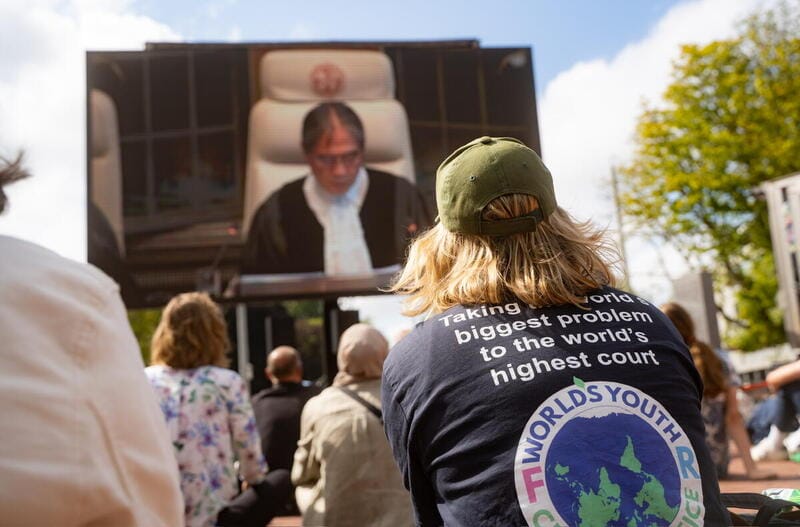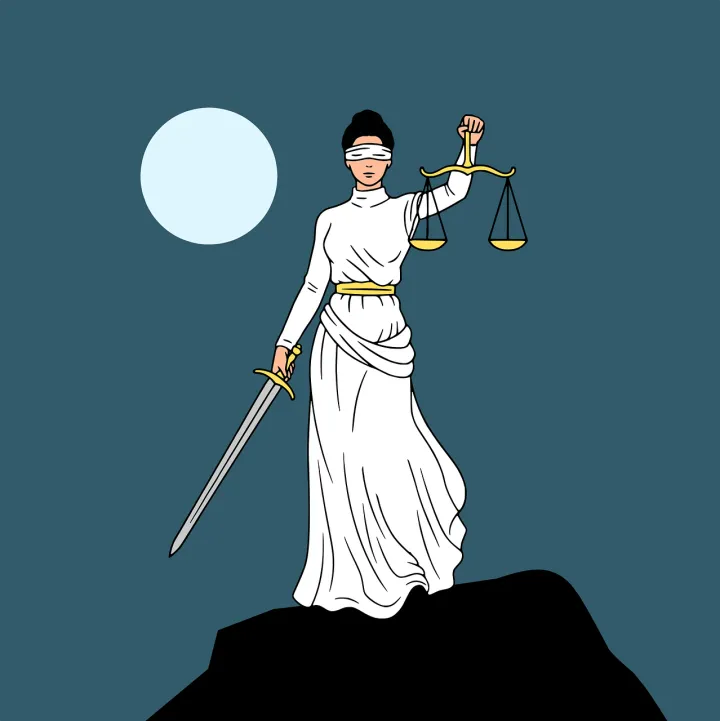Young people forced the International Court of Justice to take a legal stand on climate change. What now?

There was a huge moment for international law in July, when the International Court of Justice (ICJ) published its long-awaited advisory opinion (AO) on climate change.
Thousands of words have already been expended analysing the impacts of this 133-page document on different parts of the world, including Africa, the US, Malaysia, Luxembourg, the UK and the EU, as well as a broad range of topics from health and Indigenous peoples to financial markets and compensation.
There is also plenty of criticism swirling around. Some commentators critique its silence on specific issues, such as gender aspect of climate justice, marginalisation of children’s rights and energy equity, as well as failing to tackle the question of what happens if (or rather when) the 1.5c heating threshold is breached.
Earlier advisory opinions on climate from the International Tribunal on the Law of the Sea (ITLOS) and the Inter-American Court of Human Rights (IACHR) have taken a while to bed in.
But that was partly because people were waiting for the version from the ICJ, whose role is to harmonise and integrate international law; just two months after this was published, action is already well under way.
AO: The next resolution
Vanuatu’s first step is to submit a resolution accepting the conclusions of the court to the UN General Assembly, which called for the AO back in 2023.
Speaking at a ‘rapid reaction’ conference the day after the opinion was published, Vanuatu climate change minister Ralph Regenvanu said he would be seeking to maximise state support for the most ambitious statement possible.
The resolution only needs a majority to pass (or two thirds for what are considered ‘important questions’). But Bryce Rudyk, professor of international environmental law at New York University and legal adviser to the Alliance of Small Island States (AOSIS), says that “if the purpose is to solidify international law, then it would need to be fairly close to consensus”.
Rudyk expects the resolution to reaffirm some of the AO’s key findings.
Nearly all nations asked for this document and it aligns with the views put forward to the court by most governments.
Vanuatu itself hailed the AO as a milestone moment for climate justice, while leaders of Caribbean nations described it a “historic legal victory” for all small island states. At the rapid reaction event, Slovenian president Nataša Pirc Musar said the document was “sufficiently concrete” to provide useful guidelines for states.
However, it might be difficult to get the world’s biggest greenhouse gas emitters on board with its main conclusions, since they explicitly contradict the arguments they had put to the court.
In a statement after the AO was published, a US spokesperson told the BBC: "As always, president Trump and the entire administration is committed to putting America first and prioritising the interests of everyday Americans." Australia is apparently "carefully considering" the document.
China took the opportunity of the AO to stress its commitment to continued climate action. But it ignored the part where the ICJ implied that nations with rapidly rising emissions could now be considered developed, continuing to call itself “developing”.
A European Commission spokesperson said the opinion was “broadly” in line with the EU’s position, although it’s worth noting that it published a joint statement with China in July declaring the “central role” of the UN Framework Convention on Climate Change (UNFCCC) and the Paris Agreement. Yet French ecological transition minister Agnes Pannier-Runacher hailed it as a "victory for the most vulnerable states, a victory for France and a victory for the climate".
The UK did not bother to reply to a query from The Wave. However, even the suggestion of reparations sent the country’s right-wing politicians and commentators frothing with rage, claiming such a move would be an affront to national sovereignty.
The resolution is also expected to include actions that help to operationalise it, says Rudyk, perhaps by creating new institutions or new areas of work for the International Law Commission or the UN General Assembly’s specialist legal Sixth Committee. “These latter elements may be more complicated because of the liquidity crisis at the UN as they may have implications on the budget,” he says.
Regenvanu tells The Wave that he plans to invite all states and UN organs to take the AO into account in their laws, policies and decisions. “Content that would make the resolution effective includes: welcoming the opinion; recalling states’ duties to prevent significant climate harm and to cooperate - including through finance, technology and capacity‑building; and inviting the secretary‑general to report on follow‑up and dissemination across the UN system.”
He hopes to present it to the UN General Assembly by the end of the year.
However, Jennifer Bansard, team leader of the Earth Negotiations Bulletin at think-tank International Institute for Sustainable Development does not expect the resolution to add much to the AO as it stands. “There could very well be high-emitting states that support the resolution (as they supported the request for the AO in the first place), without it changing anything to their domestic policies.”
And if and when it passes, what then? Litigation is the first obvious avenue. Experts at law firm Watson, Farley and Williams believe the AO is likely to strengthen the legal basis for domestic, regional and international cases because it clarifies what may constitute an internationally wrongful act by a state and articulates the “legal test for causation with respect to harms caused by climate change”. Regenvanu expects parties to cite in particular the opinion’s due diligence, ‘no‑harm’ and human rights analyses.
That is already happening.
In Brazil, Candiota III Thermoelectric Plant and the Candiota Coal Mine were ordered to stop operating in August following a lawsuit brought by non-profits Friends of the Earth Brazil, Instituto Preservar and Associação Gaúcha de Proteção ao Ambiente Natural.
In its judgment, the Ninth Federal Court of Porto Alegre referenced the advisory opinion's "explicit" statement that state mitigation measures must cover fossil fuel emissions. Federal judge Rafaela Santos Martins da Rosa said she understood this to be "one of the most significant paragraphs" of the document.
Seeing environmental licencing as a "strategic tool" for implementing climate policy, the judgment criticises Instituto Brasileiro do Meio Ambiente e dos Recursos Naturais Renováveis (Ibama) for excluding coal from tougher environmental requirements, saying this may be considered inadequate in light of the enhanced duty of care required by the ICJ.
"This is a unique moment of interpretation and dialogic application between the climate legal framework and the legal framework governing environmental licensing of potentially greenhouse gas-emitting projects," says the judgment.
But that ruling is now on hold by an appeal court which says the ninth federal court overtsepped its authority into policy-making.
The AO was also referenced in a new lawsuit filed over the summer by a group of six Korean farmers suing state-owned utility company Korea Electric Power Corporation (KEPCO) for climate damages.
German non-profits also believe the document will boost their existing lawsuits challenging the adequacy of national climate policy. And while the AO was published too late to be part of pleadings against cement company Holcim in Switzerland, it was briefly referenced by the plaintiffs’ lawyer and its legal expert says it will “certainly continue to play a role as the case progresses”.
Earlier this week, the Council of Europe’s council of ministers referred to the AO in its latest update monitoring Switzerland’s compliance with the European Court of Human Rights’ landmark climate ruling.
State v state?
Much media coverage of the AO leapt on the possibility of states using it to sue each other. Litigation is “definitely” an option, Regenvanu said in response to initial questions from the press, giving an explicit warning to his high-emitting Pacific neighbour Australia.
But such a lawsuit would take a long time to build - possibly far longer than there is really time for - and could be politically very problematic. In a personal declaration, ICJ judge Georg Nolte warned that litigation, including claims for compensation, are likely to have “unintended effects”.
It’s worth noting that Regenvanu has since rowed back on his earlier comments, telling Australian publication ABC that the government has decided not to "go down that path at this time". “Our priority is cooperation on all fronts,” he tells The Wave, “including ambition and harm repair. Litigation is not an end in itself, but the clarity provided by the court supports accountability where diplomacy and policy fall short.”
There are diverging opinions on how this landmark document should be used. In a comment for Time, president Cynthia Houniuhi, president of Pacific Island Students Fighting Climate Change (PISFCC) - the youth organisation that initiated the whole process - gives her strong view that the AO should not be seen as a tool for litigation, but rather a call to international cooperation.
Margaretha Wewerinke-Singh, counsel at Blue Ocean Law who co-led Vanuatu’s legal team at the ICJ, also told the UK’s Telegraph newspaper that “litigation is not really in anyone’s interest, certainly also not in the interest of states that are seeking reparations for climate harms”.
"Litigation is not an end in itself, but the clarity provided by the court supports accountability where diplomacy and policy fall short"
But who knows? With Pacific islands reconsidering their international relationships and the advisory opinion started to be invoked to challenge specific fossil fuel projects, perhaps appetite will grow for a lawsuit one day.
One potential legal avenue would be to push governments to submit more ambitious climate plans after the ICJ said states only have “limited” discretion in what they contain and their adequacy can be assessed against objective standards. Courts in some countries, such as Mexico, have previously struck down nationally determined contributions (NDCs) for being too weak or for rolling back on previous commitments.
Over the summer, South Korean NGO Solutions for Our Climate was quick to publish a letter co-signed by other climate groups around the world. They call on parties to the Paris Agreement to ensure their 2035 NDCs, which are due in September after most failed to meet the earlier deadline, “reflect the highest possible ambition in line with limiting warming to 1.5°C”. It will be interesting to see how states respond to the resulting pledges, which are unlikely to fulfill that requirement.
Another possible candidate is the adequacy of climate finance. Wewerinke-Singh suggested to the Telegraph that a “significant and meaningful” contribution to the UN loss and damage fund from countries with a high historical emissions could avoid litigation - so presumably the reverse is true too.
The other main use of the AO will be as a political tool, and the language of diplomacy already appears to be changing in response.
At the Africa Climate Summit in Ethiopia last week, African leaders described providing climate finance as a “legal obligation” anchored in the UNFCCC and the Paris Agreement, signalling that money will continue to be a big issue at forthcoming international climate talks.
Indeed, the first major test of the power of this document will be at COP30 in Belém in November, where Regenvanu said he hopes it will have “permeated” the understanding of everybody present. “We don’t want to be in front of people making outdated, unlawful, illogical arguments that have been rejected out of hand by the advisory opinion,” he said at the rapid response event.
On the record
One potential problem is the ICJ’s statement that some COP decisions can - and do - change legal understandings of the climate change treaties.
Rudyk warns that this will “absolutely” make countries more cautious about making commitments or adopting decisions at COPs - and indeed at any formal meeting about multinational environmental treaties. “I think this will lead to adopting fewer or smaller decisions at COP," he says." I also think that it will lead to us no longer adopting the large ‘cover’ decisions that we have done in the past.”
But he thinks this is probably a good thing overall because “everything will be much more considered”.
Bansard adds that nations are already “very very cautious, or rather reluctant, to make actual commitments anyway. Some may however be increasingly cautious about any sort of reference that they are not supportive of."
Regenvanu maintains that the court simply confirmed long‑standing rules on how to interpret treaties so should not have a chilling effect. "On the contrary, clear, science‑based decisions reduce legal uncertainty and help parties meet their due diligence obligations, including to submit NDCs reflecting their highest possible ambition and aligned with the global stocktake.”
Only time will tell if that happens. “We'll need to see whether there is any (positive) change to the negotiations dynamics at the UNFCCC, changes at the domestic level, or court cases being launched against high emitters to judge whether the AO is really effective,” says Bansard.
This article was updated on 25 September to include details of judgment in Brazil that referenced the ICJ opinion.



